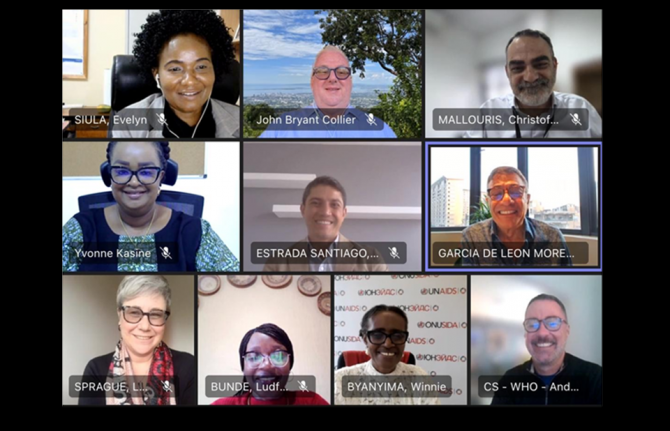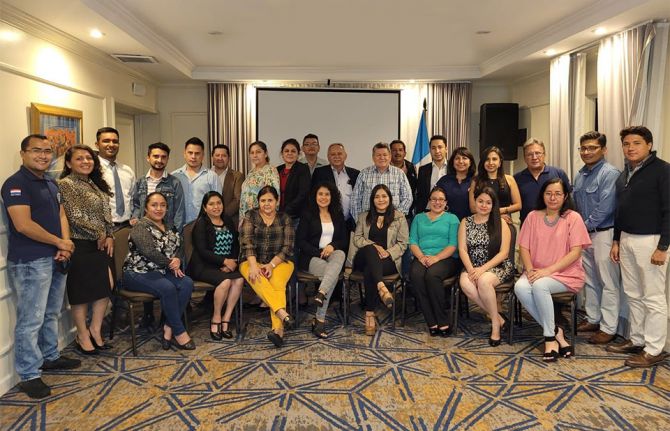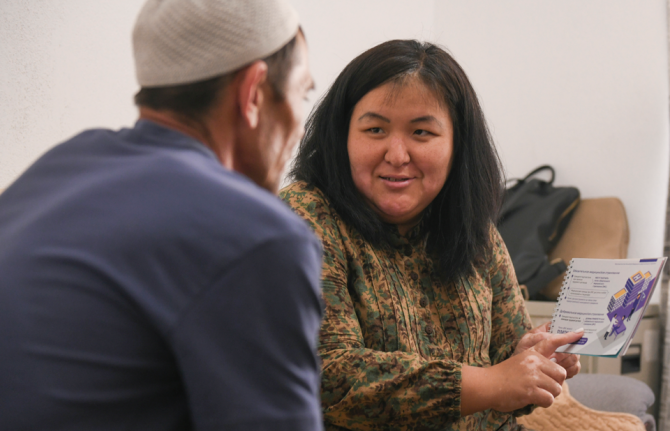
Feature Story
Ground-breaking labour instrument to address HIV in the world of work
08 June 2010
08 June 2010 08 June 2010
A ground-breaking new labour instrument to address HIV in the world of work is one of the issues considered at the annual International Labour Conference (ILC- 99th Session) in Geneva from 2-18 June 2010.
Following ILO’s formal standard setting process, an HIV/AIDS Committee, comprised of 120-150 tripartite representatives, is reviewing ILO’s draft recommendation before its final presentation to the Conference plenary for adoption on 17 June 2010. On 3 June, UNAIDS Deputy Executive Director, Ms Jan Beagle, addressed the HIV/ADS Committee to support the draft formulation of an international labour standard which will be “the first global human rights instrument to focus specifically on HIV and the world of work.”
In 2001, the ILO developed the Code of Practice on HIV/AIDS in the world of work as a framework for workplace action. Since its adoption, it has contributed to fight stigma and discrimination and to break down barriers to testing and treatment in the world of work. Although some progress has been made, prevention and care strategies need bolstering.
Many workers are still subject to stigma and discrimination and the threat, or reality, of losing their jobs due to their HIV status. The international labour standard before this Committee would help change this situation.
UNAIDS Deputy Executive Director, Ms Jan Beagle
If adopted by the ILC, the proposed recommendation on HIV - which builds on and extends the 10 key principles contained in the ILO Code of Practice - would upscale significantly the impact of prevention programmes undertaken by the ILO and UNAIDS. Protecting human rights such as freedom from discrimination play a tremendous but often overlooked role in facilitating the implementation of prevention programmes. Individuals may find in the workplace a confidential and supportive environment to access prevention, treatment, care and support when needed.
As Ms Jan Beagle expressed, “Many workers are still subject to stigma and discrimination and the threat, or reality, of losing their jobs due to their HIV status. The international labour standard before this Committee would help change this situation.”
UNAIDS welcomes in the draft recommendation the promotion of a coordinated action among governments, employers and workers alike, including networks of people living with HIV. As stated by Ms Beagle, ”one of the key strengths that the AIDS response has brought to the development table, is its capacity to connect and mobilize a wide array of constituencies.”
Ms Beagle paid tribute to the ILO Programme on HIV/AIDS and the World of Work, for having raised awareness of the social, economic and development impact of the HIV epidemic and its effects on labour and employment.
The review of the Draft Recommendation by the HIV/AIDS Committee is the last phase of a four year cycle which began in 2007 when the ILO Governing Body requested ILO to place an item on HIV/AIDS and the world of work on the agenda of the 2009 and 2010 Conferences for a double discussion leading to the adoption of an autonomous Recommendation.
Right Hand Content
Cosponsors:
Multimedia:
YouTube video: Speech by UNAIDS Deputy Executive Director Ms Jan Beagle
Speeches:
Speech by UNAIDS Deputy Executive Director Ms Jan Beagle
Feature stories:
International Labour Conference tackles HIV in the world of work (03 June 2009)
International labour standard would strengthen the HIV response in the workplace (21 July 2008)

Feature Story
New wave of cooperatives in Cameroon help HIV-positive women gain economic independence
25 February 2010
25 February 2010 25 February 2010
Honorine B has opened her own successful business as a result of the ILO/SIDA cooperative project.
Credit: ILO
Many people living with HIV face not only health issues but may also struggle to make ends meet economically. A number of HIV-positive women in north west Cameroon are taking the initiative by generating income through cooperatives, with the assistance of the International Labour Organization (ILO) funded by the Swedish International Development Cooperation Agency (Sida).
Cooperatives (coops) have historically provided much needed support for the disadvantaged, but people living with HIV have been marginalised or ignored, with coops sometimes refusing to disburse grants in the belief that investing in them would not see worthwhile returns. This project, set up last year, aims to change that.
The project aims that women gain more financial independence and generally enhance the quality of their lives. So far it has helped more than 100 women to operate in a broad range of areas including commerce, tailoring, designing, rearing pigs and poultry, secretarial support and communication services.
This is a large and notable project. A great deal of progress has been made and it has certainly had an impact at local level and reflects and responds to issues on the ground.
Dr Mamadou L Sakho, UNAIDS Country Coordinator for Cameroon
A revolving micro-credit fund scheme was set up in three micro-finance institutions across the North-west Region in Bamenda, Kumbo and Wum.
A number of safeguards were put in place by the ILO and its partners to try to ensure the project’s success. Support structures, called ‘Centres of Competence’ were provided by the CoopAfrica organization. These centres offered skills and resources for cooperative members to prosper and grow, pool resources and become increasingly empowered.
As well as funding grants for the micro-projects, assistance included training managers and psycho social and economic counsellors from the targeted micro-finance institutions to support beneficiaries. The training package contained business development, management procedures, AIDS support, counselling and stigma reduction components.
Capacity-building workshops were also held for HIV-positive women from the targeted communities on various aspects of running a business. Following the assessment of 192 micro-projects submitted after the training, 68 received seed funding and all of the beneficiaries are now running their own businesses.
Cheaka Toure from the ILO sub-regional office for central Africa believes that through this project both people living with HIV and their communities benefit. He notes that not only do resources go directly to those who are HIV-positive but they become key participants in the local AIDS response. “The project addresses HIV issues in a comprehensive and integrated way, combining behaviour change and care with economic empowerment of people living with HIV who are now main actors in their own destiny and can take care of themselves economically.”
Evodia A, one of the beneficiaries, has seen her life turned around. “I rear pigs. Before the project I had a single pig and with the funds that I got, I now have six. I have even set up a garden which is being fertilised with material from the piggery and now I harvest vegetables from the garden for my nutrition.”
A key knock-on effect of the relative success of the project is a greater self-confidence and hope among the women. Many others living with HIV have also expressed their willingness to become involved in the scheme.
Dameni Oussematou from Integrated Development Foundation, an ILO partner, has noticed this newfound self-confidence. “I am impressed by the rapid change the coop members are demonstrating. They are now business oriented…. and proud to show it. The saving habit is gaining ground; the repayment rate is 98% in two of the three cooperatives”. He adds, “And men living with HIV have expressed a strong willingness to be targeted by this intervention too”.
Dr Mamadou L Sakho, the UNAIDS Country Coordinator for Cameroon, shares this enthusiasm for the cooperatives. “This is a large and notable project. A great deal of progress has been made and it has certainly had an impact at local level and reflects and responds to issues on the ground. It would be welcome to see knowledge about the intervention reach a wider audience now.”
There have been numerous lessons learned. For instance, the capacity of the beneficiaries needs to be further built, given their heavy reliance on frequent visits from cooperative institutions to monitor their businesses and provide guidance. Identifying a greater number of activities with high income potential for the future is also suggested.
It is clear that the HIV-positive women taking part in the project have increased business acumen and insight which bodes well for their greater economic independence. A number have said that they now keep financial records for the first time and are better able to track the growth of their businesses. According to Honorine B, she has never looked back: “Before the project I bought my selling items in small quantities. I have increased my stock because of the project. I have opened a business place and have added plantains and cocoyam… I heartily thank the project.”
New wave of cooperatives in Cameroon help HIV-pos

Feature Story
Brazil post offices join Global HIV Awareness Campaign
10 February 2010
10 February 2010 10 February 2010
Campaign materials with HIV prevention messages will be sent to 800 000 households in Brazil.
Credit: M. de Sousa Silva
For the first time in Brazil, post offices will join efforts to prevent new HIV infections. The local take on the global campaign “Post Offices Fighting Against AIDS”, was launched Tuesday 9 February in a post office in Brasilia, the capital of the country.
Brazil, with an estimated 730 000 people living with HIV, is one of seven pilot-countries participating in this global initiative launched in 2009 by UNAIDS, Universal Postal Union (UPU), International Labour Organization (ILO) and UNI Global Union. The objective is to mobilize the network of 660,000 post offices around the world in the AIDS response.
The campaign will span more than 12 000 Post Offices in Brazil. Materials includes leaflets, posters, post-cards and a special letter with HIV prevention messages – all adapted to the Brazilian context.
The post office, with its wide reaching distribution network, offers a strategic entry point to reach the general population and post office staff with HIV prevention messages.
Pedro Chequer, UNAIDS country coordinator for Brazil
For example, the international slogan “Your post office cares” has been adapted to include an explicit prevention message: “The post offices are fighting against AIDS. What about you? Protect yourself: use condoms.”
The Minister of Health, Mr. José Gomes Temporão stressed the confidence and recognition of national post offices in Brazil and reinforced the commitment of the Brazilian government to the fight against prejudice, discrimination and to the consolidation of an inclusive and human rights based policy in the response to AIDS when speaking at the launch.
In the campaign’s first phase, materials will be distributed in the Federal District–where Brasilia is located–and in the priority regions of Amazonas and Bahia, states were UNAIDS and other UN agencies implement a joint programme to support the HIV response.

José Gomes Temporão, Minister of Health, and Carlos Henrique Custódio, the National Post Office President, at the launch of the post office HIV prevention campaign. Brasilia, 9 February, 2010.
Credit: M. de Sousa Silva
The Brazilian effort goes beyond the international initiative by delivering around 800 000 letters with HIV prevention messages to households in pilot regions. So for the first time ever in the country, families will receive HIV prevention information at home, through a special mail service delivery.
During the launch event, UNAIDS country coordinator for Brazil Mr Pedro Chequer said, “The post office, with its wide reaching distribution network, offers a strategic entry point to reach the general population and post office staff with HIV prevention messages. A multi-sectoral approache like this campaign will strengthen the AIDS response in the Brazil”.
For the campaign, a special web site has been launched containing information on AIDS and other sexually transmitted infections, details about the campaign with all campaign materials available for download and distribution. The web site includes a quiz for evaluation of personal HIV risk and a “contact us” section, coordinated by UNAIDS.
A special stamp has also been developed, containing the symbol of the campaign. The President of the National Post Offices in Brazil, Mr. Carlos Henrique Custódio highlighted the importance of such an initiative to be launched just before Carnival, when HIV prevention initiatives are reinforced by the government.

Pedro Chequer, UNAIDS country coordinator for Brazil spoke of the importance of a multi-sectoral approach in the AIDS response. Brasilia, 9 February, 2010. Credit: M. de Sousa Silva
In a second phase of the campaign, the International Labour Organization will support the development of a toolkit for postal employers to inform their staff about HIV in Brazil.
The “Post Offices Fighting Against AIDS” campaign is a partnership between the Brazilian Ministry of Communications, the National Post Offices, UNAIDS, the Ministry of Health, ILO, UPU, UNI Global Union and the National Federation of Employees from Post Offices, Telegraphs and related enterprises. The first phase of this global campaign will reach postal customers and post office staff in seven countries,Brazil, Burkina Faso, Cameroon, China, Estonia, Mali and Nigeria.
Contact: UNAIDS Brazil – (55 61) 3038 9220 or imprensabrasil@unaids.org
Brazil post offices join Global HIV Awareness Cam
Cosponsors:
Press centre:
UNAIDS, Universal Postal Union, UNI Global Union and ILO launch global HIV prevention campaign
Feature stories:
Nigeria launches postal service campaign for HIV awareness (21 October 2009)
International post office network to share HIV prevention messages (07 July 2009)
External links:
Universal Postal Union
UNI Global
Correios Contra AIDS
Publications:
Post Network awareness campaign posters (pdf, 578 Kb.)

Feature Story
International Labour Organization marks World AIDS Day
03 December 2009
03 December 2009 03 December 2009
ILO officials have gathered every year since 2006 to form a human red ribbon to commemorate World AIDS Day in ILO headquarters
Credit: ILO
About one hundred officials gathered to form a human red ribbon to commemorate and celebrate World AIDS Day at the International Labour Organization (ILO) headquarters in Geneva on 1 December.
This symbolic gathering was followed by ceremony moderated by Mrs Manuela Tomei, Director of the Condition of Work and Employment Programme. Mrs Maria Angelica Ducci, Executive Director, read a statement by the Director-General, Juan Somavia which highlighted the importance of enabling HIV-positive workers to remain in their jobs by eliminating stigma and discrimination. He further emphasized the need for a multi-dimensional approach with long-term commitment, creativity and diversity in order to prevent more infections.
The ILO gave a voice to people living with HIV. Mr Rodrigo Pascal from the UN System Positive Staff Group (UN Plus) presented a testimonial. He explained that UN Plus now counts 170 members, representing 28 UN entities in 43 countries. He underlined the right to work for people living with HIV: “We also have the right to keep our jobs and to be promoted according to our skills and performance.” He added that “where there is access to treatment we can live a regular life, the side effects of treatment are generally pretty manageable. We can face challenges as any other human being.”
in the absence of Dr Sophia Kisting, Director of the ILO Programme on HIV/AIDS and the world of work who is attending a special World AIDS Day Event in the context of the First African Decent Work Symposium on recovering from the Crisis Ouagadougou, Burkina Faso.
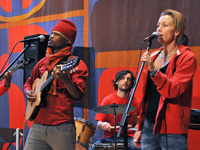
Jazz concert from the Namibian musician Jackson Wahengo and his band
Credit: ILO
A jazz concert from the Namibian musician Jackson Wahengo and his band concluded the celebration. Mr Wahengo performed his songs in Oshiwambo his native language. One such song was Takamifeni which means be careful is the message of a HIV positive father to his son.
Dr Sophia Kisting, Director of the ILO Programme on HIV/AIDS and the world of work was in attendance at a special World AIDS Day event in Ouagadougou, Burkina Faso during the First African Decent Work Symposium on recovering from the Crisis.
ILO officials have gathered every year since 2006 to form a human red ribbon to commemorate World AIDS Day. This year’s event marked the conclusion of the festivities of the 90th anniversary of the ILO, eight years after the creation of the ILO Programme on HIV/AIDS and the world of work in 2001.
International Labour Organization marks World AID
Cosponsors:
Statements:
Director-General of ILO, Mr. Juan Somavia, Message on the occasion of World AIDS Day, 1 December 2009 (pdf, 48 Kb.)
Related
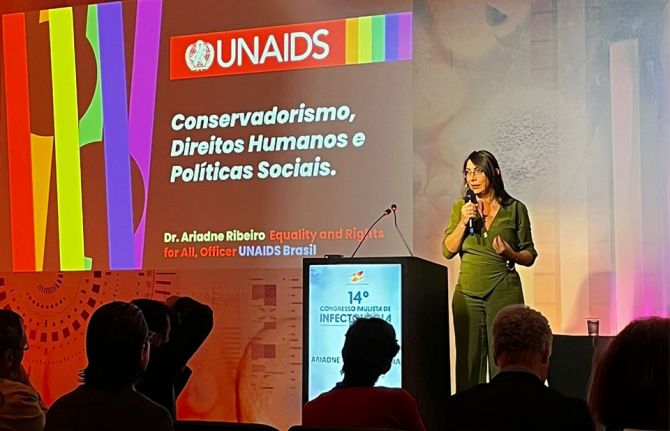 Upholding dignity for everyone: Ariadne Ribeiro Ferreira
Upholding dignity for everyone: Ariadne Ribeiro Ferreira

21 November 2024
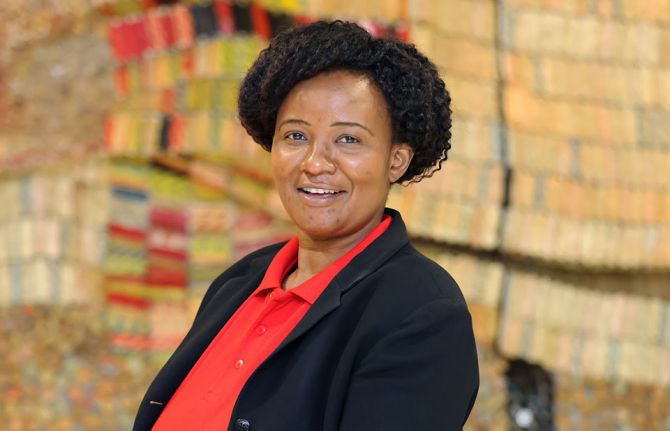 Evelyn Siula: A journey of strength and solidarity
Evelyn Siula: A journey of strength and solidarity
18 November 2024

Feature Story
Private sector in West and Central Africa explore strategic partnerships for improved health outcomes
27 October 2009
27 October 2009 27 October 2009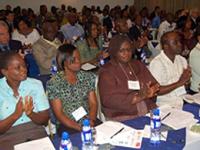
Over 150 participants from 10 WCA countries came to the workshop
Credit: UNAIDS
A strategic combination of private sector know-how and technologies with public sector expertise and funding could lead to improved health and a more efficient AIDS response in West and Central Africa. This was the message from a one day workshop held in Ghana focusing on the role of the private sector in Global Fund processes that brought together 60 companies, 10 national business coalitions tackling HIV and employers federations, as well as trade unions and development partners from all over West and Central Africa.
The workshop was organized at the initiative of UNAIDS and with the support of the Global Business Coalition on HIV/AIDS, TB and Malaria (GBC), the Global Fund to Fight AIDS, TB and Malaria (Global Fund), the International Labour Organization (ILO), the German Development Cooperation (GTZ), and Partenaires contre le Sida (PCS). The October 22 workshop followed a two day event on malaria organized by the GBC.
If we work together to ensure that the resources, know-how, and technologies of the private sector are strategically combined with public sector funding and expertise, we can significantly improve the health and well-being of people in West and Central Africa, and around the world .
John Tedstrom, President and CEO of Global Business Coalition on HIV/AIDS, TB and Malaria
“If we work together to ensure that the resources, know-how, and technologies of the private sector are strategically combined with public sector funding and expertise, we can significantly improve the health and well-being of people in West and Central Africa, and around the world,” said John Tedstrom, GBC’s President and CEO. “By sharing best practices, and collaborating with the Global Fund to ensure that help is delivered to the areas of greatest need, we may finally have the ability to slow down and eventually defeat AIDS, TB and malaria.”
During the lively discussions, participants shared ideas and identified opportunities to partner with the Global Fund both as fund recipients, and as co-investors, in order to scale-up community HIV, TB and malaria programmes. Businesses also discussed how to deploy their resources, skills and expertise to support oversight and governance of the Global Fund mechanisms and processes at the local level. Technical support providers described how and where private sector actors could obtain relevant support at each of the various stages of the Global Fund processes.

The Ministry of Health in Ghana gave the keynote speech
Credit: UNAIDS
The Minister of Health of Ghana, Benjamin Kumbuor gave a keynote speech at the event. He highlighted the importance of working hand in hand with the private sector to support the implementation of HIV, TB and malaria programmes, and that Ghana serves as a good example of this. According to the Minister, the momentum seen in his country should extend across the continent and serve as catalyst for greater impact in reducing the social and economic burden of these epidemics. It also means working collectively to yield greater return on investments and more impact on the ground. UNAIDS agrees. “We need smarter investments in the AIDS response, to ensure that we can achieve more with less,” said Léopold Zekeng, UNAIDS Country Coordinator in Ghana. “As long as there are five people newly infected for every two people starting HIV treatment, we will not change the trajectory of the epidemic. The Global Fund is a strategic and responsive investor in AIDS, and UNAIDS is working in close partnership supporting the Fund’s full grant cycle – from the development of AIDS grant proposals, to programme implementation, to monitoring and evaluation.”
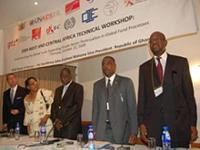
A group photo with all key partners involved in the organization of the workshop: from left to right, GBC CEO, Ghana AIDS Commission Director, Minister of Health, UNAIDS Ghana Coordinator and the UN Resident Coordinator in Ghana.
Credit: UNAIDS
Private sector in West and Central Africa explore

Feature Story
Nigeria launches postal service campaign for HIV awareness
21 October 2009
21 October 2009 21 October 2009
Nigeria’s Minister of State for Information and Communication, Mr Alhaji Aliyu Ikra Bilbis, launched the campaign.
Credit: UNAIDS
To mark World Post Day on 9 October, Nigeria held a national launch of a global awareness campaign in collaboration with the Universal Postal Union, UNAIDS, the ILO and UNI Global.
Nigeria’s Minister of State for Information and Communication, Mr Alhaji Aliyu Ikra Bilbis, launched the campaign by calling for the involvement of more stakeholders to support the government in the AIDS response in a comprehensive manner, adding, “Nigeria has demonstrated dynamism in the response to HIV.”
While congratulating Nigeria Post (Nipost) on its latest effort towards contributing to achieving the Millennium Development Goal of halting and reversing the spread of HIV by 2015, UNAIDS Country Coordinator Dr Warren Naamara said, “Nigeria has shown her commitment to achieving this MDG goal, but there is still a need to get more stakeholders and players on board so that the country’s response to HIV reaches even more people.”
The postal network has an extremely wide outreach; it is open to everyone from the young to the old and is an excellent and innovative way to raise awareness about how to prevent HIV.
UNAIDS Executive Director Mr Michel Sidibé
Dr Naamara encouraged Nipost to collaborate with the country’s National Agency for the Control of AIDS and the State Agencies for the Control of HIV to build a sustainable comprehensive multi-sectoral response to HIV and AIDS.
This innovative campaign provides post office visitors and employees with important information about how to prevent HIV through a series of eye-catching posters and hand-outs. The materials also give the address of a multi-language website on HIV prevention, hosted by UNAIDS, which provides detailed information about how to prevent infection.
The campaign in Nigeria is part of the first phase in a series of similar drives undertaken by the participating agencies in six other countries: Brazil, Burkina Faso, Cameroon, China, Estonia and Mali. The countries were chosen because of their HIV prevalence rates and to give a broad geographical spread. Nigeria has an HIV prevalence of 3.1% and ranks second only to South Africa in terms of the number of people living with HIV.
UNAIDS Executive Director Mr Michel Sidibé has commended the campaign for its innovativeness, saying, “The postal network has an extremely wide outreach; it is open to everyone from the young to the old and is an excellent and innovative way to raise awareness about how to prevent HIV.”

The Postmaster General of Nigeria Mallam Ibrahim Mori Baba read a statement at the launch.
Credit: UNAIDS
During the first phase, nearly 24,000 post offices in seven countries are displaying and distributing information materials with more UPU member countries expected to join later. For the second phase, ILO is preparing a toolkit for postal employers to inform their staff about HIV. UNI Global, a global union which brings together over 900 trade unions representing over 15 million members worldwide, is working closely with the postal departments and trade unions for this phase. The third phase is planned for 2011, where the UPU will invite its member countries to issue a stamp to commemorate the identification of AIDS in 1981.
In many parts of the world, post offices already have a social role by promoting public health messages within their community. Over the next three years, the campaign will be expanded globally, potentially making its way into 600,000 post offices worldwide. This would mean that millions of people who use postal services every day as well as the 5.5 million postal employees worldwide would receive important information about how to prevent HIV transmission.
Nigeria launches postal service campaign for HIV
Cosponsors:
Press centre:
UNAIDS, Universal Postal Union, UNI Global Union and ILO launch global HIV prevention campaign
Feature stories:
International post office network to share HIV prevention messages (07 July 2009)
External links:
Universal Postal Union
UNI Global
Publications:
Post Network awareness campaign posters (pdf, 578 Kb.)

Feature Story
China’s vocational schools play a key role in AIDS education
16 October 2009
16 October 2009 16 October 2009
Vocational schools in China provide an avenue for reaching thousands of young people with HIV/STI prevention messages. Credit: ILO
The Zhaoqing Vocational School in Guangdong, China, provides basic technical skills to several thousand migrant workers a year. It is also one of the first schools of its kind in the country to include information on sexuality, reproductive health and HIV in its core curriculum. This model has now been scaled up nationally with technical assistance from the International Labour Organization (ILO).
Programmes like the one supported by ILO can serve as an excellent model to reach tens of millions of young people and their partners in China, right at the age when they are most prone to behaviours that put them at risk of HIV or other sexually transmitted infections.
Dr Bernhard Schwartländer, UNAIDS Country Coordinator in China
Many graduates from Zhaoqing’s school will find jobs along the province’s Pearl River Delta, which is the largest manufacturing zone in the world and employs over 60 million migrant workers from China’s rural areas. Before the students, who range in age from 14 to 19, enter the world of work, teachers are committed to imparting knowledge which will help protect them against frequent incidences of unwanted pregnancies and reportedly high rates of sexually transmitted infections such as HIV.
For many young people at the school the intervention seems to be working and they are reaping the benefits of greater openness and access to information. According to one female student, “At the beginning of HIV training I felt very nervous and shy. After the teacher's explanation I felt natural and accepted what she said. I felt I had known nothing about HIV… People with HIV are not dangerous and they don't deserve any discrimination.”
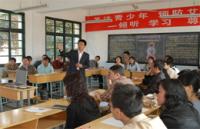
Vocational schools in China provide an avenue for reaching thousands of young people with HIV/STI prevention messages. Credit: ILO
Using the example of Zhaoqing and other similar schools, the ILO and the United States Department of Labor, (USDOL) have set out to reach as many of the 18 million students in the country’s 16,000 vocational schools as possible.
The ILO/USDOL project, known as SHARE (Strategic HIV/AIDS Responses in Enterprises), recognises that vocational schools are in a position to reach large
numbers of vulnerable young people with HIV, STI and reproductive health
training. A survey of 1,602 female students from vocational schools in Anhui, for example, showed that nearly 12% said they had had sex and, among these, more than 60% reported pre-marriage pregnancies.
Based on this need, SHARE has established programmes in 1000 vocational schools and trained over 2000 teachers in delivering participatory training. The Chinese Ministry of Human Resources is supporting this effort with a national policy which requires all vocational schools under its authority to integrate STI, HIV and reproductive health training into the psychological health curriculum.
According to Richard Howard, ILO Chief Technical Advisor of the HIV/AIDS workplace education project in China, "It is estimated that with the capacity built
in the vocational schools, five million students will be reached in China over the next five years.”
The authorities in the country are very much aware that, despite early successes, the project needs careful monitoring and evaluation. “Challenges ahead include how to track the impact of this intervention,” says Zheng Dongliang, from the Ministry of Human Resources and Social Security and National Project Director of the ILO/USDOL HIV/AIDS workplace project. He adds, "We can now assess how that knowledge has been transferred during examinations but our objective is to facilitate behaviour change and we are looking at ways to better monitor and evaluate the impact of the interventions to make sure we achieve positive behaviours among these vulnerable youth.”
In principle, sex education in Chinese schools was established in 1992. However, its implementation and effectiveness varies. Ms. Li Hua, a teacher at the Wuhu vocational school reports that “most often it is the teachers who are embarrassed to talk about sex with their students. The students are eager to learn and – when given the right space – talk openly about their experiences”. It is one of the objectives of this programme to equip teachers with the knowledge, the skills and tools to frankly discuss sexual and reproductive health issues in class.
“It is refreshing and encouraging to see teachers and students interact in a lively and imaginative way about rather private matters”, says Dr Bernhard Schwartländer, UNAIDS Country Coordinator in China. “Programmes like the one supported by ILO can serve as an excellent model to reach tens of millions of young people and their partners in China, right at the age when they are most prone to behaviours that put them at risk of HIV or other sexually transmitted infections.”.
China’s vocational schools play a key role in AID
Cosponsors:
Partners:
United States Department of Labor (USDOL)
Feature stories:
UNAIDS Task Team develops effective tools to help young people tackle HIV (05 June 2009)
Migrant workers and HIV vulnerability in South Asian and South East Asian countries (18 May 2009)
HIV response and the education sector: UNESCO Best practice series (04 May 2009)
'Never abandon, never give up’: ILO film helps China’s migrant workers challenge AIDS stigma (30 April 2009)
Publications:
A Strategic Approach: HIV & AIDS and Education UNAIDS IATT on Education, 2008 (pdf, 2.43 Mb.)

Feature Story
New initiative to train India’s people living with HIV on AIDS advocacy in the workplace
07 October 2009
07 October 2009 07 October 2009Today, October 7 2009, we mark World Day for Decent Work. The International Labour Organization, a Cosponsor of UNAIDS, works towards achieving the globally endorsed goal of Decent Work. Rights at work include freedom from discrimination, expansion of employment opportunities, social protection for all and social dialogue.

Supporting the rights of people living with HIV in the workplace: The Honourable Shri Mallikarjun Kharge, Union Minister of Labour and Employment (speaking) and Syed Mohammad Afsar, ILO’s HIV and AIDS Technical Specialist for South Asia and National Project Coordinator for India
Picture courtesy of ILO
An innovative tool in India’s response to HIV in the world of work has just been launched by the International Labour Organization (ILO) and the India Network of People living with HIV/AIDS (INP+). The two organizations have come together to release a unique training video and handbook package aimed at guiding those living with the virus in AIDS advocacy in the workplace.
Unveiled by the Honorable Shri Mallikarjun Kharge, Union Minister of Labour and Employment, the package contains testimonies from people living with HIV (PLHIV) in workplace settings as this has proven to be a very effective training initiative in the past. Practical, and offering step-by-step guidelines, it is designed to encourage HIV-positive people to be open about their status and spread the message of tolerance, anti-discrimination and respect for human and employment rights for those affected by the virus across the country.
The video and handbook have been developed with contributions from more than 100 people living with HIV and are available in both English and Hindi.
We cannot stress enough the importance of the rights of people living with HIV – to respect, dignity, access to care and treatment, and here in this project, the right to work. Building the capacity of people to advocate this is critical and we salute the achievements of ILO and INP+ in this regard.
Charles Gilks, UNAIDS Country Coordinator, India
One active participant in this process is Hari Singh, a board member of the Delhi Network of People Living with HIV, who has been working with the ILO in advocacy initiatives since 2007. He spoke at the launch of his growing confidence in talking about his HIV status. He now speaks to employers, workers and trade unions about his life experience and provides clear and specific anti-AIDS messages.
As in many other countries and communities, AIDS stigma and discrimination are still rife in Indian society, including the workplace, and a number of individuals have been hounded from their jobs because of their status. According to Naveen Kumar of the Delhi Network of Positive People, this can have devastating consequences: “If you take away our jobs, you will kill us faster than HIV.” Removing punitive laws, policies, practices and stigma and discrimination that block effective responses to AIDS is one of the nine priority areas in the UNAIDS Outcome Framework 2009-2011.
This latest intervention is part of an ongoing umbrella project spearheaded by the ILO in India, the first country in the world to implement an ILO technical cooperation project on HIV following the creation of the agency’s programme on HIV/AIDS and the world of work in 2001. From the very beginning, a person living with HIV has been represented on the ILO Project Management Team.
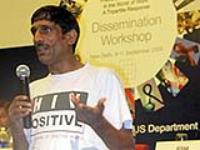
Hari Singh addresses the launch of the video and handbook package. He has been working with the ILO to make sure that the voices of PLHIV are heard in the workplace.
Picture courtesy of ILO
“The ILO in partnership with INP+ has been actively pursuing the principle of right to employment and other basic employment-related rights of PLHIV in the development and implementation of HIV workplace policies and programmes,” explains K.K. Abraham, INP+ president.
As Syed Mohammad Afsar, ILO’s HIV and AIDS Technical Specialist for South Asia and National Project Coordinator in India maintains, “Work is just as important as treatment for people living with HIV. The ILO Code of Practice on HIV/AIDS and the world of work includes non-discrimination for purposes of employment as one of its key principles. People should be allowed to work and earn a living as long as they are fit to work.”
The ILO India project has been supported by the United States Department of Labour and, more recently, by the US President's Emergency Plan for AIDS Relief (PEPFAR). It is now seen by many as something of a yardstick for other programmes executed by the ILO with ministries of labour and with employers’ and workers’ organizations to address AIDS in the world of work.
“In the ILO project, we have been building the capacity of people living with HIV and engaging them from the beginning. So far, 165 PLHIV from 20 networks in India have been trained in workplace advocacy programmes,” Mr Afsar added.
According to Charles Gilks, the UNAIDS Country Coordinator for India, the initiative is highly welcome. “We cannot stress enough the importance of the rights of people living with HIV – to respect, dignity, access to care and treatment, and here in this project the right to work. Building the capacity of people to advocate this is critical and we salute the achievements of ILO and INP+ in this regard.”
New initiative to train India’s people living wit
Cosponsors:
Partners:
India Network of People Living with HIV/AIDS (INP+)
United States Department of Labour (USDOL)
Multimedia:
Watch Prevention of HIV in the World of Work on YouTube
Feature stories:
Morocco: Coming together to strengthen the AIDS response in the workplace (10 July 2009)
International Labour Conference tackles HIV in the world of work (03 June 2009)
ILO and workplace leaders pledge action at ICASA 2008 (04 December 2008)
International labour standard would strengthen the HIV response in the workplace (21 July 2008)
ILO sees significant improvement in workplace attitudes to HIV (25 April 2008)
Health workforce crisis limits AIDS response (29 February 2008)
Publications:
AIDS is everybody's business: UNAIDS & business - working together (pdf, 863 Kb.)
Employers' handbook on HIV/AIDS: a guide for action (pdf, 609 Kb.)
UNAIDS Outcome Framework 2009-2011 (pdf, 396 Kb.)

Feature Story
UNAIDS Cosponsors out in force for 9th ICAAP
09 August 2009
09 August 2009 09 August 2009
The 10 UNAIDS Cosponsors are presenting a strong showing as thousands of delegates converge in Bali, Indonesia, to share ideas, knowledge, best practices, lessons learned and research findings at the 9th International Congress on AIDS in Asia and the Pacific (ICAAP).
The Cosponsors are an integral part of the UN’s response to the global AIDS epidemic and UNAIDS brings together their efforts and resources.
Echoing the Congress theme, ‘Empowering people - strengthening networks’, the Cosponsors are organising and presenting symposia, skills-building workshops and satellite meetings drawing together a number of participants from a range of disciplines with the aim of helping to build and nurture partnerships to bolster the AIDS response in the region.
A number of events are joint Cosponsor initiatives. For example, the Symposium on ‘HIV prevention and most at risk young people’, taking place on 10 August, is sponsored by UNFPA, UNICEF, UNESCO, UNDP, WHO and UNAIDS. The symposium, hosted by the Asia Pacific Regional UN Coordination Group on Most at Risk Young People, is designed to look at the specific needs of this population which is, in general, not being reached by HIV prevention services. This includes injecting drug users, men who have sex with men and sex workers and their clients. Representatives from these groups will also take part in the panel discussion –one further example of how Cosponsor ICAAP activities are designed to involve key populations.
Other examples of Cosponsor activities include UNDP, ILO and UNAIDS (with the Joint United Nations Initiative on Mobility and HIV/AIDS in South East Asia) collaborating on a joint symposium on 12 August entitled, ‘The Impact of the Financial Crisis on Labour Migration and HIV’ in which they will bring their respective expertise to bear on this pressing international issue. UNHCR, along with UNAIDS, is hosting a satellite session on 12 August called ‘Opportunities and challenges in addressing HIV amongst diverse humanitarian populations’. WFP will use a satellite session on 11 August to explore the vital role of nutrition and food security for people living with HIV and will, along with its partners, look at ‘Models for integrating nutrition and food security into HIV care, support and treatment in the Asia Region: Opportunities and challenges’.
The World Bank is also championing the screening, on 10 August, of the film, Suee (Needle) by Cannes Film Festival award winner, Sai Paranjpye, which deals with the lives of injecting drug users and the anti-AIDS stigma they face. The film emerged from the South Asia Region Development Marketplace, a grant programme spearheaded by the Bank and supported by a range of partners including UNAIDS, UNICEF, UNODC and UNDP.
There is an extremely broad range of other Cosponsor activities taking place over the five days of the Congress and a number of these events will be highlighted on the UNAIDS website as the ICAAP progresses.
UNAIDS and its ten Cosponsors work to provide technical support to countries to assist them in the implementation of their national AIDS plans. A ‘division of labour’ guides the technical support provided to enhance coordination, avoid duplication and provide the best assistance available. Each of the Cosponsor organizations leads in at least one technical area. These organizations are:
Office of the United Nations High Commissioner for Refugees (UNHCR)
United Nations Children's Fund (UNICEF)
United Nations Development Programme (UNDP)
United Nations Population Fund (UNFPA)
United Nations Office on Drugs and Crime (UNODC)
International Labour Organization (ILO)
United Nations Educational, Scientific and Cultural Organization (UNESCO)

Feature Story
Morocco: Coming together to strengthen the AIDS response in the workplace
10 July 2009
10 July 2009 10 July 2009The world of work is a key arena for successfully challenging the AIDS epidemic, which affects the most economically active in every population. The majority of those living with the virus across the globe are workers. To promote this challenge in Morocco, the Ministry of Employment, in collaboration with the International Labour Organization (ILO) and UNAIDS, hosted a two-day national workshop on HIV workplace programmes in Casablanca at the end of June.
Bringing together actors from a number of sectors, the meeting included representatives from trade unions, government ministries, employers and businesses, NGOs, people living with HIV, medical officers and experts. It is the first of this scale and reach to be held and over 60 discussion topics were explored.
The initiative of developing a sectoral plan on HIV workplace programmes by the Ministry of Employment makes Morocco a pioneer country among other low prevalence countries.
Dr Moucharafou Idohou, ILO/AIDS National Project Coordinator
The main aim of the workshop was to progress towards the development of a strategic AIDS plan. This three-pronged plan would include: HIV prevention in the workplace; care and support for people living with the virus and tacking stigma and discrimination; and management and coordination of the challenge to AIDS.
In order to arrive at this goal, the first day of the meeting was devoted to exploring the country's AIDS response in the world of work to date, which included a high-level discussion on challenges and lessons learned in developing HIV programmes in this sector. The principles and guidelines of the ILO, with emphasis on its Code of Practice on HIV and the world of work, adopted in 2001, were also examined.
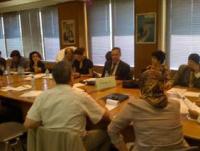
It was noted that a great deal of good work had already been achieved by a number of individuals and organizations, including the Association Marocaine de Lutte contre le Sida (Moroccan Association for the Fight against AIDS - ALCS), AIDS Entreprises Morocco (a national network of companies working on HIV and STI programmes in the workplace), as well as trade unions and occupational physicians. However, all still face a number of constraints in integrating the AIDS response into the world of work.
Dr Moucharafou Idohou, the ILO National Project Coordinator in Benin, attended the Conference to present core ILO policy tools and share experience of workplace action in Francophone West Africa. He said he was pleased at progress made so far. "I congratulate the Moroccan authorities on their commitment to the AIDS response on the basis of a multi-sectoral approach and for including the workplace in this response. The initiative of developing a sectoral plan on HIV workplace programmes by the Ministry of Employment makes Morocco a pioneer country among other low prevalence countries."
The challenge to AIDS in the workplace is a key opportunity on the road to achieving universal access. We must pay special attention to the workers who are most at risk in terms of HIV infection and to the informal sector.
Dr Kamal Alami, UNAIDS Country Coordinator for Morocco
While working towards the development of the strategic plan, participants took a number of areas into consideration. They debated how to move towards implementing a programme aimed at the most vulnerable, i.e. informal and mobile workers.
Also necessary would be strengthening the capacity of employers’ organizations, unions and other business institutions, while mobilizing their resources for HIV prevention and education activities and challenging stigma and discrimination. How to continue raising awareness of the human rights aspect of HIV and its impact on companies, and setting a legal framework which could serve as a basis for national AIDS programmes responding to HIV in the world of work, were also discussed.
There were a number of conclusions emerging from the workshop. The delegates recommended:
- Setting up a national committee to focus on HIV in the workplace with representation from employers, unions and the government;
- Development of advocacy activities to sensitize social partners;
- Adapting the legislative framework to ensure good HIV programmes in the . workplace;
- More research on most at risk groups;
- Mobilization of national and international funding to implement the strategic AIDS plan.
The government of Morocco, through the Ministry of Employment, reiterated its commitment and willingness to work with its partners to effectively implement a national plan to respond to HIV and STIs in the workplace.
According to UNAIDS Country Coordinator for Morocco, Dr Kamal Alami, “The challenge to AIDS in the workplace is a key opportunity on the road to achieving universal access. We must pay special attention to the workers who are most at risk in terms of HIV infection and to the informal sector."
Morocco: Coming together to strengthen the AIDS r
Cosponsors:
Feature stories:
International Labour Conference tackles HIV in the world of work (03 June 2009)
Migrant workers and HIV vulnerability in South Asian and South East Asian countries (18 May 2009)
International labour standard would strengthen the HIV response in the workplace (21 July 2008)
ILO sees significant improvement in workplace attitudes to HIV (25 April 2008)
Health workforce crisis limits AIDS response (29 February 2008)
Publications:
Health workforce crisis limits AIDS response 29 February 2008 (pdf, 863.1 Kb.)
Employers' handbook on HIV/AIDS: a guide for action (pdf, 609 Kb.)
ILO Code of Practice on HIV/AIDS and the world of work

